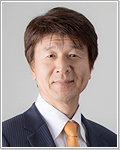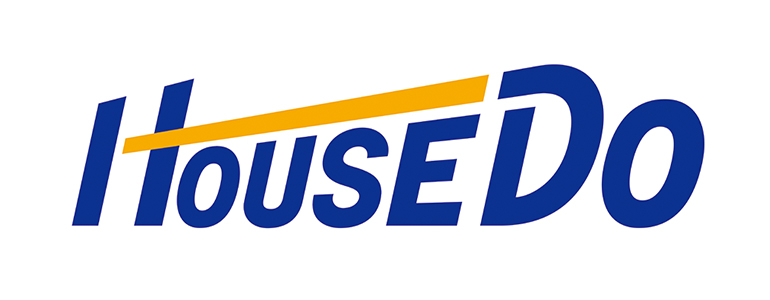| HOUSEDO Co, Ltd. (3457) |
|
||||||||
Company |
HOUSEDO Co, Ltd. |
||
Code No. |
3457 |
||
Exchange |
1st section of TSE |
||
Industry |
Real estate business |
||
President and CEO |
Masahiro Ando |
||
Address |
Headquarters: 11F, Marunouchi Trust Tower North, 1-8-1 Marunouchi, Chiyoda-ku, Tokyo Head Office: 670 Tearaimizu-cho, Nakagyo-ku, Kyoto-shi, Kyoto |
||
Year-end |
End of June |
||
URL |
|||
* The share price is the closing price on February 24, 2017. The number of shares issued was taken from the brief financial report for the latest period.
ROE and BPS are those for the previous term. |
||||||||||||||||||||||||
|
|
* The forecasted values were provided by the company.
This report provides the outlines of HOUSE DO Co., Ltd., the description of its mid-term managerial plan, and the earnings results, among others. |
| Key Points |
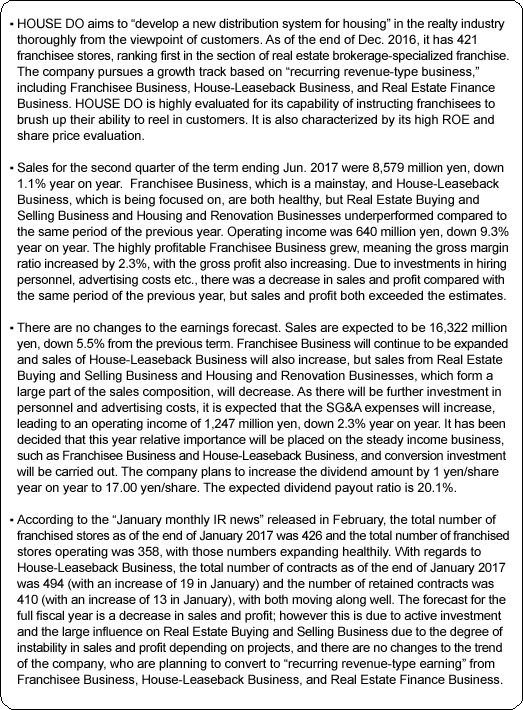 |
| Company Overview |
|
Strongly doubting the situation in which services are enterprise-oriented while they should be customer-oriented, such as the lack of transparency, he responded to the needs of customers appropriately, and offered a lot of information on property speedily, winning the trust of customers and then improving business results. When he visited the U.S. to see the realty industry there, he was deeply impressed by a franchisee real estate broker conducting community-based business competing with large companies while caring about customers. He felt that doing this business in Japan is meaningful and valuable, because it would lead to the reform of the Japanese realty industry, and started developing a franchise chain for real estate brokerage in Japan. In Feb. 2006, he launched Franchisee Business. When he approached real estate brokers, they were reluctant at first, but he gave careful instructions to personnel in other fields, including architecture and renovation, who have keen interests in real estate. His business was highly evaluated, partially because there were no companies that teach real estate practice, and the franchise chain grew healthily. In Jan. 2009, he established HOUSE DO Co., Ltd. As its business expanded, its brand power was strengthened steadily, and HOUSE DO was listed in Mothers of Tokyo Stock Exchange in Mar. 2015. Moreover, the company moved its market from Mothers to 1st section of TSE in Dec. 2016. All of them are based on President Ando's awareness and thoughts about the current Japanese realty industry.  (The business segments to be reported for the term ended Jun. 2016 are "Franchisee Business," "Real Estate Business (composed of Real Estate Buying and Selling Business and House-Leaseback Businesses)," "Real Estate Brokerage Business," and "Housing and Renovation Business." Real Estate Finance Business is categorized into "Others.") 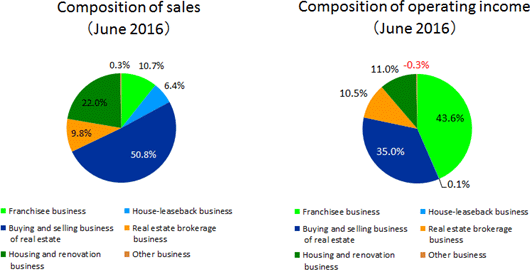 (1) Franchisee business
(Outline)
HOUSE DO provides small and medium-sized real estate firms that require a brand or network and enterprises that plan to launch real estate distribution business with the know-how of real estate brokerage and trading (attracting customers, IT strategies, education and training and motivating employees etc. For the purpose of popularizing its brand throughout the market, the company has implemented brand strategies while featuring Mr. Atsuya Furuta, who is a former professional baseball player and coach and currently a baseball commentator, since Jul. 2013. HOUSE DO has been advertised actively via TV and radio commercials, signboards, flyers, the mass media, websites, etc., announcing consistent brand strategies. By superimposing Mr. Furuta's personality, working attitude, and sincerity onto the image of HOUSE DO, the company won the trust of customers, making them feel secure. By developing a nationwide chain, HOUSE DO aims to increase the transparency of information and create reliable, convenient contact points with customers under the corporate ethos. Since its franchise system provides franchisees with a variety of methods for reeling in customers for increasing sales based on the experiences of its headquarters and directly managed stores and the practical know-how to educate personnel, even enterprises that have no experience of real estate brokerage can start the business, and so it is highly evaluated. Many enterprises from different industries became franchisees, accounting for 70%. 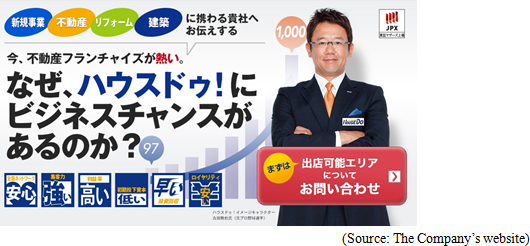 Through these efforts, the company has developed close networks among the headquarters, directly managed stores, and franchisee stores. The number of franchisee stores approximately doubled in the past 5 years. The company first aims to increase the number to 1,000 in Japan. The royalties the company receives from franchisees are monthly fixed, without fluctuations. 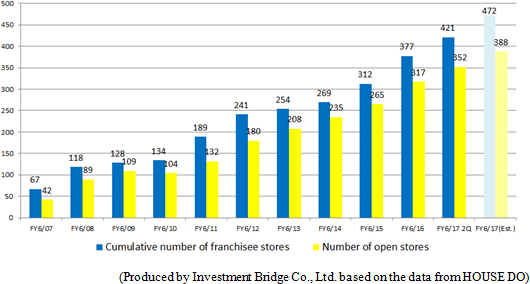 (Major services)
Provision of website systems
HOUSE DO offers practically useful systems that have been nurtured in business scenes since its inception, including the systems information provision, including online search, support for sales and business operation, and matching. "DO NETWORK!," which is aimed at increasing and retaining customers efficiently and streamlining business operation to the maximum degree, is equipped with various functions for producing original flyers, managing property, customers, and sales staff to reduce the burden of routine work. Training for franchisee stores
As for education, HOUSE DO carries out sales training, through which even inexperienced real-estate agents can learn the fundamentals and become competent sales people, and trains staff for IT-based sales activities, financial planning, and property assessment, to support franchisee stores in improving their business capabilities. In training, the company utilizes "DO CHANNEL!," which has website-based learning functions/e-learning systems, in addition to group learning. This system has over 1,000 contents, and trainees can attend necessary courses online anytime. After franchisee stores are opened, supervisors give appropriate instructions and regional study sessions are held regularly. Supervisors give strategic guidance for marketing, attracting customers, managing sales activity records and sales, reviewing store management, etc. At "HOUSEDO! National FC Conference," which is attended by the staff of all franchisee stores, they share the corporate targets and goals of the next fiscal year and the latest information on real estate, and excellent stores are commended, for motivating employers and employees. At the session, they share the successful cases of franchisee stores each other, and brush up themselves through friendly competition. (2) House-Leaseback Business
HOUSE DO concentrates on House-Leaseback Business as one of the future core businesses. President Ando came up with the concept that "you can keep living in your house even after selling it" and aired it by radio, causing greater repercussions than expected. Therefore, he started commercialization, and completed it in a few months. (What is House-Leaseback?)
"House-Leaseback" means a sales and leaseback system with which real estate owners can keep living in their houses in accordance with a lease contract with HOUSE DO after selling the houses to the company. Going beyond the conventional purchase system, which only provided an option to "sell real estate," the company offers services under the concept of "utilizing real estate." 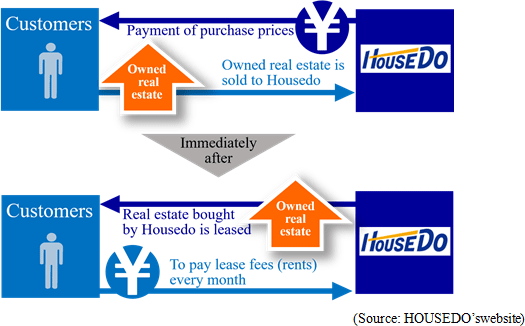 (Background of the growth of House-Leaseback Business, and the market environment)
House-Leaseback Business is in demand for the following reasons:
This system offers a significant advantage - they can continue their business using business assets while paying lease fees in accordance with lease contracts. This business category was named "Asset-leaseback," and it was launched in Aug. 2015. According to "Statistical Survey on Housing and Land 2013" (the Ministry of Internal Affairs and Communications), the number of households and the ratio of homeowners in Japan are as tabulated below.  As birthrate is declining and nuclear families are increasing, the necessity to own houses declines if there are no heirs or the number of family members is small. Accordingly, it is expected that more seniors will have cash for leading more affluent lives, and then the ways of living of elderly people will change considerably. The trend of such changes can be verified by the fact that 3 megabanks have recently started "reverse mortgage," which means that customers borrow money from financial institutions by pledging their houses and when they die, the financial institutions foreclose and sell the houses through auction, to recoup the money. It is expected to grow considerably like House-Leaseback Business. (House-Leaseback Business of HOUSE DO)
HOUSE DO, which launched House-Leaseback Business in 2013, excels at evaluating markets based on its assessment skills, which have nurtured for many years, selling products, and dealing with transactions with a nationwide network of stores.This business is attractive to HOUSE DO in the following aspects: (3) Real Estate Buying and Selling Business
(Outline)
HOUSE DO acquires real estate, adds value, and sells them to general customers and investors - the company buys, renovates, and sells used houses, builds and sells new housing, develops residential land, renovates and sells buildings for investment. For procuring real estate, the company gathers information from its directly managed stores, franchisees, and "Project Partner System," which is a collaborative business with real estate agents. Since HOUSE DO operates both the Real Estate Brokerage and Sales Businesses in an integrated manner, it has a good grasp of the needs from sellers and buyers, and owns contact points throughout Japan. Accordingly, it can procure and sell real estate while considering regional characteristics and demand. (Major services)
Services for corporations
Under the policy of "taking full advantage of good real estate information," HOUSE DO operates collaborative systems and business models with franchisee stores and real estate agents around Japan. "JV Partner System" (joint purchase of real estate) is a new business model for purchasing and selling real estate by combining the information gleaned from directly-managed and franchisee stores and realty firms nationwide and HOUSE DO's financial power and sales capabilities. Services for individuals and corporations
HOUSE DO directly buys real estate by utilizing nationwide networks with its directly managed and franchisee stores. When requested by a customer, staff can visit the customer on that day, and suggest a price on the spot. This is one of the reasons why HOUSE DO is highly evaluated. Assessed prices are suggested in three stages: "price for selling in about 3 months," "price for selling in about 1 month," and "price for immediate purchase" in brokerage. Under the brand mantra of increasing the transparency of information, the company discloses the nearby cases by using "DO TOUCH! MAP," which is a system for disclosing information on real estate, so that general customers can trust the company and have transactions without anxiety. Operation of stores
HOUSE DO operates stores as "Store for buying houses and other real estate." Its stores are operated also as annexes to Satellite Stores for Real Estate Brokerage Business, and suggest purchase prices, while selling real estate as brokers. (4) Real Estate Brokerage Business
(Outline)
In Real Estate Brokerage Business, HOUSE DO introduces not only "ready-built houses," "used houses," and "land," but also proposes the combinations of "land and new house construction," "used houses and renovation," "selling plans and relocation," etc. while accurately grasping the needs of customers. Also for financial plans and insurance, the company gives proposals to customers from the early stage, and comprehensively supports customers in buying their houses without worry. HOUSE DO aims to reform the Japanese realty industry drastically, and develop a new distribution system for housing, so that customers can move into their ideal houses according to their life stages. It hopes to transfer the initiative from the realty industry to customers who live in houses. Accordingly, the company aims to establish a highly transparent, flexible distribution system for trading real estate without anxiety after understanding property, by disclosing information on real estate and delivering information within 24 hours after receiving an inquiry. In detail, the company swiftly provides customers with the latest information on real estate with various methods, including the online media such as the Internet and websites, newspaper inserts, housing magazines, and the posting system for distributing flyers to each household around each store. (Major services)
Website for retrieving real estate
The company operates "HOUSEDO.com," which enables customers to search for the real estate managed by franchisee stores and directly managed stores throughout Japan, and "Do-search!," a realty search engine exclusively for each store."HOUSEDO.com" is a portal site operated by the FC headquarters of HOUSE DO, which features recommendable houses in each area, around each railroad line, or in the vicinity of each station and finds desirable real estate based on the date of stores nationwide. It is aimed at introducing a wide array of houses to customers around Japan. "Do-search!" enables customers to search for real estate managed by each store, and respective stores take the initiative in operating it. It is aimed at offering information to local customers swiftly based on community-based sales activities combining flyers, ads directly put into mailboxes, etc. Operation of stores
HOUSE DO brokers real estate deals via "Housing information mall," a roadside large-scale store, and "Satellite Store," a directly managed store specializing in sales and brokerage. The company not only introduces real estate, but also proposes renovation, financial plans, and insurance at the early stage, to offer one-stop services at the "Housing information mall".
(5) Housing and Renovation Business
This is composed of "Housing Business," which undertakes the construction of new houses, and "Renovation Business," which renovates housing.
(Outline of Housing Business)
"Housing Business" is based on the following three: (1) "Architect Produce Japan" for creating original homes with architects, (2) "Afternoon Home" that propels you to stay in a living room in the afternoon, and (3) "Do! Select" for creating houses from the 20s, under the concept: "Each home has a story. Rather than creating an unprecedented thing, we create houses for existing families. We will select new homes for families."
(Outline of services)
New construction brand site
According to each customer's preference and budget, they can freely choose from (1) a fully-customized house to be created with an architect, (2) a customized house focused on a living room, and (3) a customized house that can be arranged by combining preferable plans from 100 plans.
Operation of stores
HOUSE DO receives orders for the construction of new houses at Kyoto Chuo Showroom, Kyoto Kita Showroom, and Housing information mall, which is directly managed by the company.
(Outline of Renovation Business)
In the 21st century, the company set up the concept of "recology," which is coined by fusing "recycle" and "ecology," and aims to renovate housing for the coming 100 years. The company has a service menu for a broad range of customers and prices, including the repair for restoring used houses to their original states, the large-scale remodeling or renovation for adding new value, such as functions and design, after-sale maintenance, and minor remodeling for dealing with troubles. As standard services, the company inspects houses and checks earthquake resistance, and has an enriched guarantee system (issuing a warranty for every construction work, offering a warranty for up to 10 years, taking out a liability insurance contract for up to 100 million yen, guaranteeing the operation of housing equipment for up to 10 years, and so on). These services allow customers to feel secure. (Outline of services)
Operation of websites
In addition to the portal site for all kinds of renovation services, the company operates a website for the remodeling of plumbing, roofs, and outer walls.
Operation of stores
HOUSE DO offers this service at Kyoto Chuo Showroom, Kyoto Kita Showroom, and Housing information mall, which is directly managed by the company.
(6) Real Estate Finance Business
HOUSE DO offers realty-backed loans to individuals and corporations so that they can procure funds by utilizing their real estate. Some customers who inquired about House-Leaseback service can pledge their real estate, and some other customers do not need to dispose of their real estate for procuring necessary funds. In addition, the company meets various needs for the funds for the trading between relatives or parents and children, whose trading price tends to become opaque making it difficult to receive loans from banks, the funds for purchasing a second house or real estate for investment, the funds for business operation and equipment investment of enterprises, by offering realty-backed loans based on the appropriate, speedy evaluation with reference to the information on real estate around Japan, using HOUSEDO Chain. As the business that complements House-Leaseback Business, it is expected to grow. (1) Ability to supervise franchisee stores
What matters most to franchisee stores is "how to reel in many customers?" in Franchisee Business, which is the mainstay of HOUSE DO. President Ando insists that the ability to supervise the stores for attracting customers is the most significant strength of HOUSE DO.The improvement of the ability to reel in customers means the practice of the corporate ethos since its inauguration: "Customers' needs can be satisfied by providing them with a lot of information swiftly." The provision of know-how via the online system "DO NETWORK!" and franchisee training is highly evaluated by franchisee stores, and considerably facilitates the growth of the franchise chain. 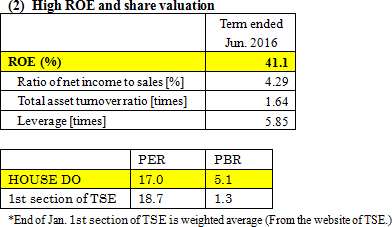 to be described later, leverage is estimated to increase by 0.2 points in a period till the term ending Jun. 2019, and the ratio of net income to sales is projected to rise 2.5% due to the expansion of the recurring revenue-type business, but ROE is forecasted to decline to about 28%, as total asset turnover will decrease about 1 point. Nevertheless, ROE will be still high. Because of this, share valuation (PER and PBR) is relatively high in the real estate field. |
| First half of the fiscal Year June 2017 Earnings Results |
 The main Franchisee Business was healthy, and Real Estate Buying and Selling Business etc., saw a decrease in sales and profit compared to the previous year. The forecast was exceeded.
Sales were 8,579 million yen, down 1.1% year on year. Both Franchisee Business, which is a mainstay, and House -Leaseback Business, which is being focused on, were both healthy, but Real Estate Buying and Selling Business and Housing and Renovation Business fell short of figures in same period of the previous year.Operating income was 640 million yen, down 9.3% year on year. The highly profitable Franchisee Business grew, meaning the gross margin ratio rose by 2.3%, with the gross profit also increasing. Due to investments in hiring personnel, advertising costs etc., there was a decrease in sales and profit compared with the same period of the previous year, but sales and profit both exceeded the estimates. 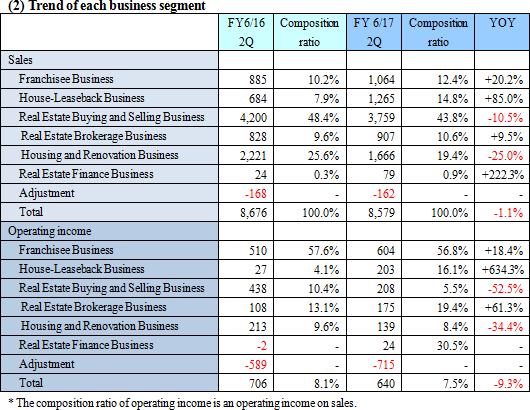 (1) Franchisee Business
Sales and profit increased.In addition to effective advertising through TV and radio commercials encouraging real estate agents in urban areas to become affiliated, Franchisee Business, which is the key part of the steady income business, saw an improvement in creditworthiness and corporate brand value from being listed on the first section of the Tokyo Stock Exchange, and 64 new franchise contracts brought the total number of franchise contracts up to 421. Furthermore, the construction of a system where supervisors follow up on franchised stores, and the enhancement of all types of service contents showed results, with 54 new open stores bringing the total number of open stores up to 352. (2) House-Leaseback Business
Sales and profit increased.The number of inquiries and projects handled increased, due to increased visibility resulting from effective TV and radio commercials, and an improvement in creditworthiness due to being moved onto the first section of the Tokyo Stock Exchange. The number of contracts was 150, up 46 year on year, and the number of real estate acquired was 140, up 36 year on year. 17 real estates were sold off, with sales amounting to 642 million yen. The company owns a total of 397 real estates, worth 6,135 million yen (total value at the time of acquisition, unamortized). (3) Real Estate Buying and Selling Business
Sales and profit decreased.Due to projects carried over to the previous period from the period before that, as well as a large-scale 200 million yen project, both income and profit fell short of the same period of the previous year. With directly managed stores, the company put efforts into exercising synergy with the agency division through continued, thorough enforcement of the procurement plan for real estate that meets the needs of customer agencies. Meanwhile, in terms of real estate for investment focused in urban areas, and high price band products, the company elected to procure property while taking risk into consideration, and so the unit cost decreased. The number of continued projects was 145, down 39 year on year. (4) Real Estate Brokerage Business
Sales and profit increased.The number of brokerage transactions increased by 81 year on year to 1,407. Continued super-low interest home loans was effective, and actual demand was firm. In addition to advertising strategies making use of media, such as newspaper foldout advertisements, TV and radio commercials, and online advertising strategies including a homepage, the company also made efforts to attract customers to directly managed stores through local-based posting strategies. Being listed on the first section of the Tokyo Stock Exchange also had an effect, and earning power increased. (5) Housing and Renovation Business
Sales and profit decreased.In Renovation Business, as well as aiming to take in orders for renovation in addition to sales of existing housing through ties with real estate agency businesses, the company also attracted customers by actively holding a renovation event called "Renovation Festival." Due to temporary influence from the end of the previous period due to the postponement of the consumption tax increase, and a decrease in orders for new housings, the number of orders received declined by 11.8% from the previous year, down to 1,057, and the number of completed houses declined by 16.3% from the previous year, down to 1,079. (6) Other business
Sales and profit increased.In the Real Estate Finance Business, the company developed new markets by flexibly responding to customers' various financial needs through the provision of real estate security loans making use of the real estate assessment force, the Group's strength. In addition, as a result of focusing efforts on group synergy within the company, including House -Leaseback Business, and cooperation with franchised stores, a total of 47 real estate security loan contracts were implemented (the target for the whole fiscal year was 42), and the loan balance was 1,080 million yen, far surpassing this period's estimate: 420 million yen. 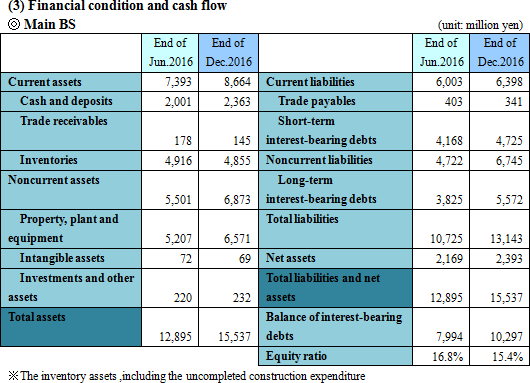 Long- and short-term interest-bearing debt increased 2,302 million yen from the end of the previous term due to the expansion of real estate for sale and house leaseback projects, and total liabilities increased to 13,143 million yen, up 2,417 million yen from the end of the previous term. Net assets increased to 2,393 million yen, up 224 million yen from the end of the previous term. As a result, equity ratio dropped from 16.8% to 15.4%, a decrease of 1.4%.  Financing CF grew due to an increase in long-term loans etc. The cash position improved. (4) Topics
In order to heighten the company's appeal as a target for shareholder appreciation and investment, the company has decided to expand the shareholder benefit points system.◎ Changes to the shareholder benefits system The company will grant points in proportion to the number of acquired shares and length of time holding the shares. Shareholders will be able to exchange the points they have acquired for food, electrical goods, gifts, etc., on a site set up specifically for shareholders, and they will also be able to make donations to activities contributing to society. Up until now, the company had decided to award 9,000 points at the start of the year to shareholders with at least 1,000 shares, and 9,900 points for those holding their shares for over 2 years. However, the company has raised the numbers to 11,000 points for shareholders with at least 2,000 shares (12,100 points for shares held for over 2 years), and 13,000 points for at least 3,000 shares (14,300 for shares held for over 2 years). The revised benefits system will be applied to shareholders listed as holding at least one unit on the shareholder register as of the end of Jun. 2017. ◎ Improvements in precision and service expansion of real estate automatic assessment using artificial intelligence (AI)
The company and its subsidiary, FinancialDo Co., Ltd., are working with real estate estimated market value data independently computed using AI, owned by Collabit Inc. (Yokohama-shi, Naka-ku, CEO: Tsuyoshi Asami), provider of "HowMa," the service that allows anyone to easily check the market price of real estate. On February 16th, the company launched a smartphone app and an online assessment service where the estimated market value of real estate properties all over the country can be checked through simple information input.The company group is providing the smartphone app "Do! BANK," which allows users to check approximate mortgage estimates. However, as the database uses Real Estate Business and contract information handled by the HOUSEDO! Chain, the assessment results need to be improved in areas where there are no stores. By working together with Collabit's real estate estimated market value data calculated using AI, the company aims to improve the accuracy of real estate estimated market value and expand the assessment areas, and it is anticipated that consumers will be able to easily understand the value of their real estate, facilitating real estate dealings at fair prices. From now on, the company plans to increase the amount of real estate contract information through widening its network of stores, and improve assessment accuracy through analysis and study of AI data. The company would like to aim to make the information even more freely available, and fluidize its real estate stock. |
| Fiscal Year June 2017 Earnings Estimates |
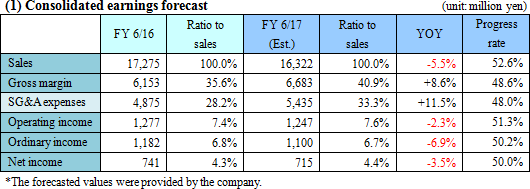 There are no changes to the earnings forecast. The company expects to focus on investment, with a decrease in sales and profit.
The earnings forecast for the second quarter has been upwardly adjusted, but there are no changes to the earnings forecast for the whole fiscal year.Sales are expected to be 16,322 million yen, down 5.5% year on year. Franchisee Business will continue to expand and sales in House-Leaseback Business will continue to increase. However, sales from Real Estate Buying and Selling Business and Housing and Renovation Businesses, which form a large part of the sales composition, will decrease. While sales will drop, expansion in the highly profitable Franchisee Business will cause gross profit to rise 8.6% year on year, and the gross margin ratio to improve by 5 points. As there will be further investment in personnel and advertising costs, it is expected that the SG&A expenses will augment, leading to an operating income of 1,247 million yen, down 2.3% year on year. For the acquisition of capital gain, it has been decided that this year the position of Real Estate Buying and Selling Business will be held down and relative importance will be placed on the steady income business, such as Franchisee Business and House-Leaseback Business, with conversion investment carried out. The company plans to increase the dividend amount by 1 yen/share year on year to 17.00 yen/share. The expected dividend payout ratio is 20.1%. 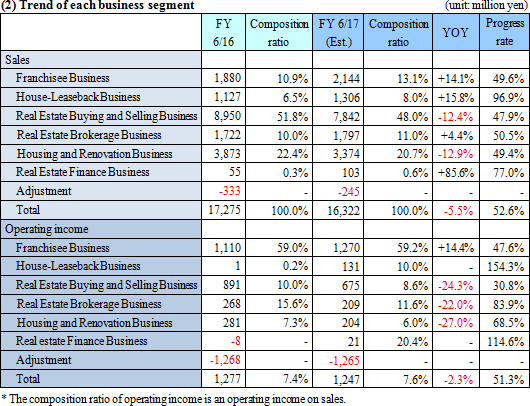 (1) Franchisee Business
Sales and profit are predicted to increase.The company will focus on continuing to expand the numbers of contracts and stores. Through synergy with real estate agency businesses and real estate purchasing businesses, the company will promote the joint establishment of "satellite stores" and "housing/real estate purchasing specialist stores." The company plans to increase the number of franchise contracts by 95 year on year to 472, and the number of newly opened stores by 71 year on year to 388. (2) House-Leaseback Business
Sales and profit are predicted to increase.The company will further strengthen personnel and advertising to accelerate growth. The number of contracts is estimated to grow 26.9% year on year to 288, and the number of pieces of real estate acquired is projected to increase 29.7% year on year to 288. The cumulative total number of pieces of real estate is estimated to increase twofold to 522, worth 7,861 million yen, up 77.6% year on year. (3) Real Estate Buying and Selling Business
Sales and profit are predicted to decrease.In terms of real estate for investment and high-priced products mainly in urban areas, which are affected by the rise in real estate prices, turmoil in the financial market, etc., the company will secure its position while paying attention to risk, and concentrate on collaborating with the brokerage division in areas with directly managed stores. The number of transactions is estimated to be 322, equal to the number in the previous term. Inventory assets are projected to be 5 billion yen, equal to the amount in the previous term. (4) Real Estate Brokerage Business
Sales are predicted to increase, and profit is predicted to decrease.The number of brokerage transactions is forecast to rise 8.4% year on year to 2,925. The company will shift personnel to House-Leaseback Business, while pursuing effective synergy with related businesses, including purchase, renovation, fire insurance, and mortgages. (5) Housing and Renovation Business
Sales and profit are predicted to decrease.The number of contracts for renovation and new construction and the number of houses delivered are forecasted to be less than the previous term. The company will seize opportunities to make transactions for existing houses, and promote order for renovation. (6) Real Estate Finance Business
Sales are predicted to increase, with the business returning to profit.There will be a full-scale launch of the Real Estate Finance Business through ties with House-Leaseback Business. As mentioned earlier, at the end of the second quarter both the number of loan contracts executed and the loan balance greatly exceeded predictions for the full fiscal year. |
| Conclusions |
|
In House-Leaseback Business, the total number of contracts as of the end of January 2017 was 494 (with an increase of 19 in January) and the number of retained contracts was 410 (with an increase of 13 in January), with both moving along well. The forecast for the full fiscal year is a decrease in sales and profit; however this is due to active investment and the large influence on Real Estate Buying and Selling Business due to the degree of instability in sales and profit depending on projects, and there are no changes to the trend of the company, who are planning to convert to "steady income" from Franchisee Business, House-Leaseback Business, and Real Estate Finance Business. |
| <Reference1: Mid-term managerial plan> |
|
It is outlined as follows. ◎ Growth strategy
HOUSE DO aims to shift from the "labor-intensive earning" based on Real Estate Brokerage, Real Estate Buying and Selling and Housing and Renovation Businesses to the "recurring revenue-type earning" based on Franchisee, House-Leaseback and Real Estate Finance Businesses. The term ending Jun. 2017, which is the first year of the mid-term managerial plan, marks a turning point, and the company will invest in its 3 primary businesses. 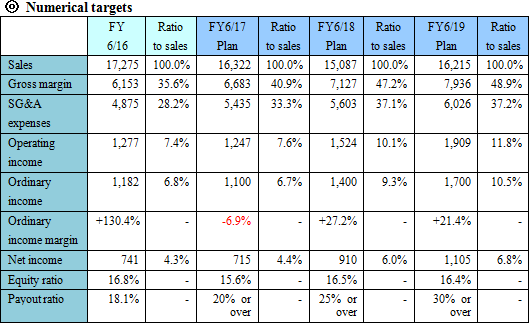 ◎ Trend of each business segment
As for the composition of the recurring revenue-type business, both sales and segment income are estimated to increase significantly as tabulated below.
 "Recurring revenue-type business (1): Franchisee Business"
HOUSE DO will keep advertising activities, etc. with the aim of achieving 1,000 franchisee stores.
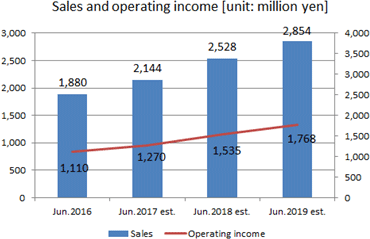 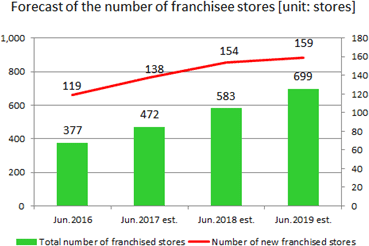 "Recurring revenue-type business (2): House-Leaseback Business"
Rapid growth is expected in the above mentioned market environment.
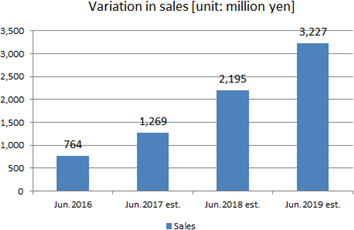 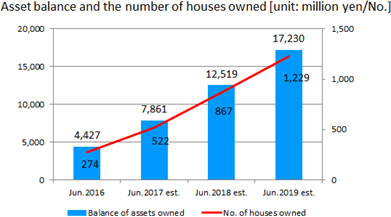 "Recurring revenue-type business (3): Real Estate Finance Business"
This business is complementary to House-Leaseback Business, which is expected to grow considerably in parallel with the growth of House-Leaseback Business.
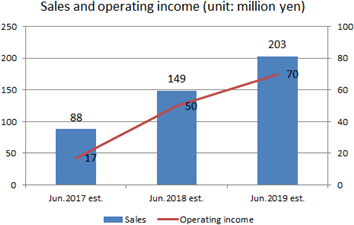 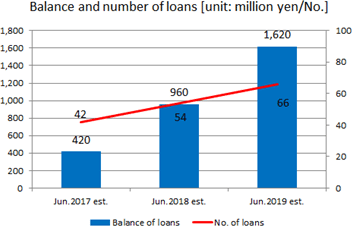 "Real Estate Buying and Selling Business"
Real estate will be selected rigorously within the sales range from 5 to 8 billion yen. In cooperation with the brokerage section, this section will keep procuring property steadily in the target areas of directly managed stores.
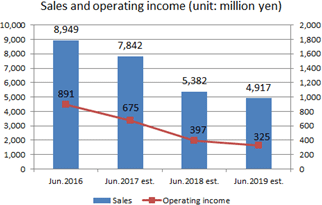 "Housing and Renovation Business"
HOUSE DO will propose renovation while selling and remodeling used houses. The company will concentrate on the remodeling with natural materials, and promote home inspection (housing structure assessment) and aseismic reinforcement. The company will also work on the cooperation between Real Estate Brokerage and House-Leaseback sections.
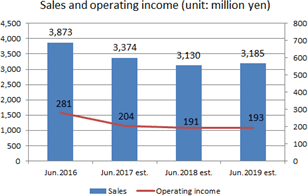 "Real Estate Brokerage Business"
By taking advantage of the governmental policy for "vitalizing the trading of used houses," HOUSE DO will work on the cooperation between the real estate brokerage and the renovation sections. In addition, the company will promote the related businesses, including renovation, mortgage, and fire insurance, by utilizing contract opportunities. 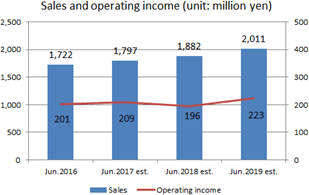 |
| <Reference2: Regarding corporate governance> |
 ◎ Corporate Governance Report
The company submitted the latest corporate governance report on Nov. 17, 2016.
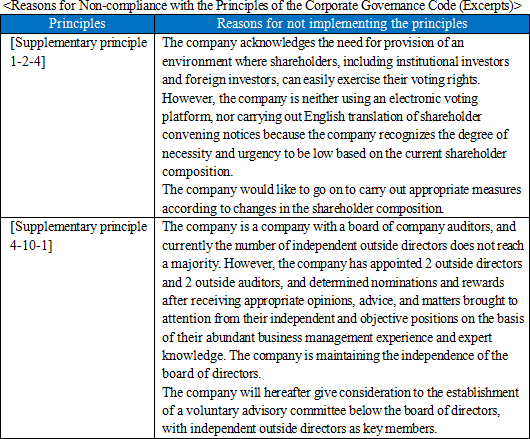 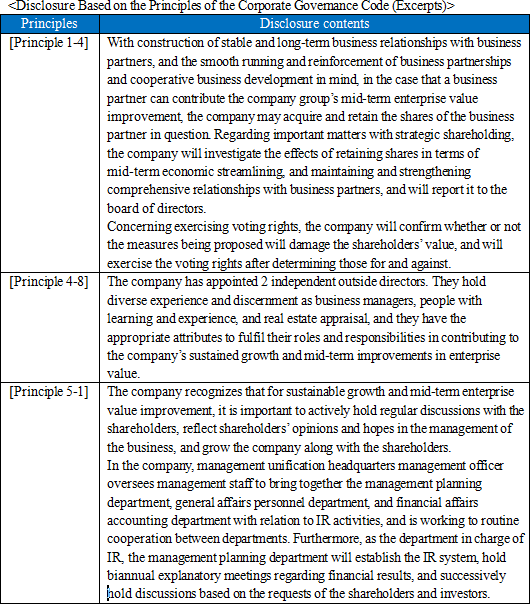 |
|
Disclaimer
This report is intended solely for information purposes, and is not intended as a solicitation to invest in the shares of this company. The information and opinions contained within this report are based on data made publicly available by the Company, and comes from sources that we judge to be reliable. However we cannot guarantee the accuracy or completeness of the data. This report is not a guarantee of the accuracy, completeness or validity of said information and or opinions, nor do we bear any responsibility for the same. All rights pertaining to this report belong to Investment Bridge Co., Ltd., which may change the contents thereof at any time without prior notice. All investment decisions are the responsibility of the individual and should be made only after proper consideration.Copyright(C) 2017 Investment Bridge Co., Ltd. All Rights Reserved. |

